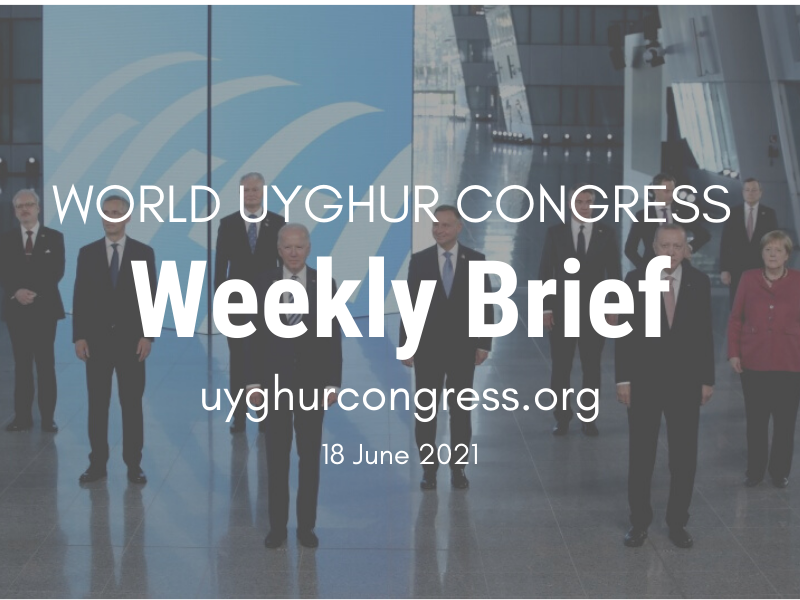Weekly Brief: 18 June


NEWS
German Parliament Adopts “Supply Chain Diligence Act”
On June 11th, the German Bundestag adopted the “Supply Chain Due Diligence Act”. It includes a number of points that have the potential to contribute to greater human rights and environmental due diligence by companies in their value chains. The Supply Chain Act initiates an urgently needed paradigm shift in Germany, unfolds a preventive effect, and creates strong regulatory oversight and enforcement.
Though the WUC has welcomed the adoption of the new Act, it similarly reiterates that it is still too weak to adequately prevent companies from being complicit in human rights abuses such as Uyghur forced labour. As WUC President, Dolkun Isa, argued in an Op-Ed in die Zeit, for such legislation to be truly effective, it must be mandatory for all companies regardless of their size, and must address the question of civil compensation.
WUC Participates in G7 Prayer Breakfast: The Right to Freedom of Religion or Belief (FoRB) for All
On June 13th the Bishop of Truro, the Rt Revd Philip Mounstephen and the leader of the Orthodox Coptic Church in the UK, His Eminence Archbishop Angaelos of London, hosted a prayer breakfast dedicated to the Right to Freedom of Religion and Belief. The panel discussion State-sanctioned Atrocities on FoRB: The G7 Role in Upholding International Religious Freedom included contributions from Nury Turkel, a U.S. Commissioner on International Religious Freedom, British MP Lord Alton and a number of other guests working in the field of freedom of religion or belief. Moreover, WUC President, Dolkun Isa, as well as WUC London Program Director, Rahima Mahmut, also participated in the event.
Czech and Belgian Parliaments Adopt Motions on Genocide and Crimes Against Humanity
On June 14th, the Czech Senate unanimously adopted a motion, with 38 to 0, which noted the “massive violations of human rights and freedoms, genocide and crimes against humanity, ethnic discrimination, and the suppression of cultural, religious and political identity in the PRC”. The motion also called for the Czech Government to stage a diplomatic boycott of the upcoming Beijing 2022 Winter Olympics, arguing that their presence could be “misused to legitimize further discrimination, violence and suppression of fundamental rights.”
On June 15th, the Belgian Parliament nearly unanimously passed a joint motion in the External Affairs Commission of the Belgian Chamber of Representatives, that recognizes crimes against humanity and a “serious risk of genocide” being perpetrated against the Uyghurs. The Belgian parliament thereby becomes the sixth parliament in the world, after the Canadian, Dutch, British, Lithuanian, and Czech parliaments, that recognizes a (serious risk of) the Uyghur genocide. The joint motion will now move to the plenary session on July 1st, where all parties will reconfirm the text.
China figures prominently in G7, NATO, and EU-US Summits
From 11 to 15 June, a series of important summits (G7, NATO, EU-US) were held, during each of which China figured as a central theme of discussion. The leaders of the Group of Seven (G7) met in Cornwall on 11-13 June 2021, after which their communiqué noted their concern over human rights violations in East Turkistan. This was followed by a NATO summit in Brussels on June 14th, whose communiqué for the first time presented China as a systemic challenge to a rules-based international order and international security. Finally, US President Biden visited Brussels on June 15th, where he met with Council President Michel and Commission President Von der Leyen. In the joint summit statement that followed, the US and EU committed to continuing “coordinating on our shared concerns”, including the ongoing human rights violations in East Turkistan.
WUC Commemorates 1988 Student Protest
On the 15th of June, the WUC commemorated the 33rd anniversary of Uyghur student protests in Urumqi of June 15th, 1988. The wave of democracy protests led by Uyghur students in East Turkistan complemented democracy protests sweeping across China until the Tiananmen massacre. The protests stood as an early reaction to Chinese policies in the 1980s that openly discriminated against Uyghur students in particular, and one of the first large-scale public responses to discriminatory policies against Uyghurs.
“During my university years, I started realising that Uyghur students were being heavily discriminated against. The entire system was based on discriminatory policies,’’ said WUC President Dolkun Isa. “In 1988, Uyghur students found the courage and organised themselves to call for an end to the Chinese government’s repression of Uyghurs. Now, the entire Uyghur community is calling for the international community to end the Uyghur genocide.’’
PARTICIPATE
June 23 Join the WUC in calling for a boycott of the Beijing Olympic Games under the #NoBeijing2022 campaign, as part of a Global Day of Action. The WUC will be holding a protest in Lausanne and Brussels, with partner organisations.

